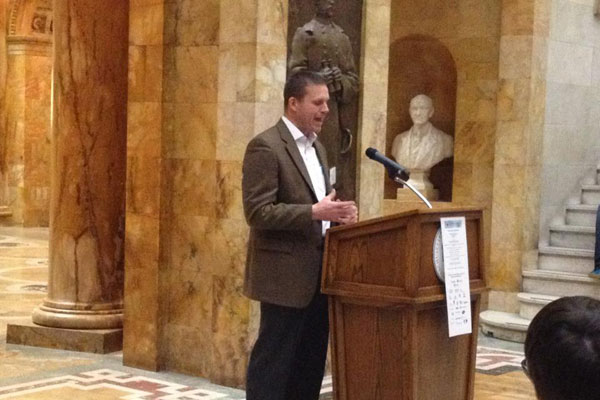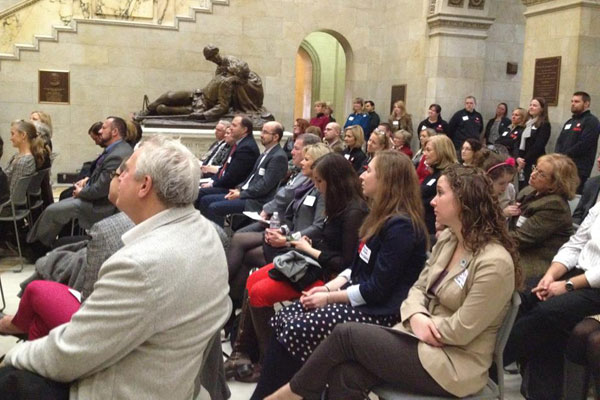Rare Disease Day: Raising Awareness for Uncommon Conditions
 Hereditary angioedema patient Greg Costa speaks at the Massachusetts Rare Disease Day event. Photos by Jamie Ducharme
Hereditary angioedema patient Greg Costa speaks at the Massachusetts Rare Disease Day event. Photos by Jamie Ducharme
Shrewsbury native Greg Costa had his first hereditary angioedema (HAE) attack when he was nine years old. With no treatments for the condition available until 2010, HAE—a rare genetic disorder that causes severe abdominal cramping and episodes of swelling in the face, airways, hands, and feet— forced Costa, unable to predict when his next bout would come, to live in fear. Perhaps worse, he had never met anyone who knew what he was going through.
“I grew up my whole life with this, and until a couple years ago I’d never spoken to anybody else that had the disease,” Costa says. “You’re almost on an island by yourself.”
But today, Costa is not alone. February 28 is the official Rare Disease Day, a day aimed at raising awareness for rare diseases and to offer support for those living with them. Instead of directing its efforts toward one specific disease—which is defined in the United States as any condition that affects fewer than 200,000 people at any given time—the day is for the rare disease community as a whole.
A celebration of the day sponsored by the Schwachman Diamond Syndrome Foundation and the Massachusetts Biotechnology Council took place at the State House today and included patients like Costa speaking about their experiences, state legislators talking about the importance of public policy support, and the delivery of the proclamation—run relay-style from the Burlington offices of Dyax Corp., the biotechnology company that developed the pharmaceutical for HAE, to the State House—declaring the last day of February as Massachusetts Rare Disease Day.
Blair Van Brunt, president of the Shwachman-Diamond Syndrome Foundation and mother of a child with the disease, says its important for the entire rare disease community to rally together to affect real change. “The more voices that speak up in unison, the more they can be heard,” she says.
Dyax Chief Operating Officer Ivana Magovčević-Liebisch, who ran the last leg of the proclamation delivery, says Rare Disease Day is an important reality check. “If we didn’t have days like this, it would be very easy to forget that these people suffer just as much as anybody else who has some other disease that’s much better known and better studied,” she says. “It’s so important to continue to talk about these rare diseases and to make sure people are aware and understand the importance of continuing to do research.”
Magovčević-Liebisch says events like Rare Disease Day elevate and augment the day-to-day efforts of companies like Dyax. “With this kind of event, you raise it to a different level,” she says. “You get people that you might not necessarily get to pay attention.”
Van Brunt says that raising awareness also helps the general public because researching better treatments and diagnostic tools for rare diseases can save taxpayer money. Also, the science behind rare disease research can be applied to a number of different conditions. “Those research dollars are actually really working for everybody, not just the person in that very rare disease,” she says. “The more awareness we can bring to the whole rare disease world, it’s actually going to trickle down.”
Beyond research or public policy, though, things like Massachusetts Rare Disease Day are for the patients, Costa says. “Being able to talk to other people that have it or learn from other people and how do they deal with it, I found that to be a very powerful thing,” Costa explains.
Costa says he never pictured himself being involved in advocacy work, but that the feeling he gets from helping other rare disease patients is incomparable. “It’s really rewarding for me coming away afterwards going, ‘Wow, this person seems a little bit more at ease,” he says. “The more awareness that’s out there, the better it is for everyone.”
 Duplication 12q syndrome patient Carla Charter.
Duplication 12q syndrome patient Carla Charter.

The audience gathered at the State House.


